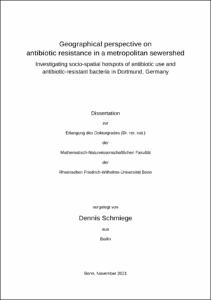Schmiege, Dennis: Geographical perspective on antibiotic resistance in a metropolitan sewershed : Investigating socio-spatial hotspots of antibiotic use and antibiotic-resistant bacteria in Dortmund, Germany. - Bonn, 2022. - Dissertation, Rheinische Friedrich-Wilhelms-Universität Bonn.
Online-Ausgabe in bonndoc: https://nbn-resolving.org/urn:nbn:de:hbz:5-65453
Online-Ausgabe in bonndoc: https://nbn-resolving.org/urn:nbn:de:hbz:5-65453
@phdthesis{handle:20.500.11811/9604,
urn: https://nbn-resolving.org/urn:nbn:de:hbz:5-65453,
author = {{Dennis Schmiege}},
title = {Geographical perspective on antibiotic resistance in a metropolitan sewershed : Investigating socio-spatial hotspots of antibiotic use and antibiotic-resistant bacteria in Dortmund, Germany},
school = {Rheinische Friedrich-Wilhelms-Universität Bonn},
year = 2022,
month = feb,
note = {Antibiotic resistance is a serious global health threat, driven by the inadequate and excessive use of antibiotics. Environmental compartments, particularly wastewater, occupy a pivotal role in the spread of antibiotic-resistant bacteria. Wastewater treatment plants reduce the bacterial load significantly but cannot remove everything.
Reducing the input of antibiotics and antibiotic-resistant bacteria into wastewater at the source, this doctoral thesis focused on the sewershed of a wastewater treatment plant and the role of the general population. The goal was to investigate socio-spatial hotspots of antibiotic use in the community and antibiotic-resistant bacteria in untreated municipal wastewater. Three working packages formed the core of this work: a systematic literature review on the determinants of antibiotic use, a cross-sectional household survey in the general population and culture-based laboratory analyses of untreated municipal wastewater in three socio-spatially different urban areas within a metropolitan sewershed.
Findings from the systematic literature review emphasise the importance of considering both individual- and space-related factors as determinants of antibiotic use in the community. Compositional variables, i.e. the characteristics of individuals living in a specific area, predominated, but potential area effects of contextual (i.e. opportunity structures in the local environment) and collective (i.e. socio-cultural and historical features) factors also showed some influence.
The cross-sectional household survey revealed small-scale area differences in antibiotic use, and related knowledge, attitudes and practices between communities. Study participants in the socio-spatially disadvantaged area were less knowledgeable, reported more often attitudes contrary to common recommendations and displayed more often antibiotic use and potential mishandling practices.
Untreated municipal wastewater from the three areas was tested for the occurrence of extended-spectrum beta-lactamase (ESBL)-producing Escherichia coli (E. coli). This work demonstrated that the general community is an essential source of phenotypic ESBL-producing E. coli in wastewater and revealed spatial variations. ESBL-producing E. coli counts and proportions of multidrug-resistant isolates were higher in the socio-spatially disadvantaged area.
Integrating the results, self-reported antibiotic use and the counts of phenotypic ESBL-producing E. coli were higher in the socio-spatially disadvantaged area pointing towards a possible spatial association. This doctoral thesis highlights the importance of considering higher spatial resolutions and the local spatial context and thereby demonstrates the benefit of applying a geographical perspective by explicitly considering the spatial dimension of antibiotic resistance.},
url = {https://hdl.handle.net/20.500.11811/9604}
}
urn: https://nbn-resolving.org/urn:nbn:de:hbz:5-65453,
author = {{Dennis Schmiege}},
title = {Geographical perspective on antibiotic resistance in a metropolitan sewershed : Investigating socio-spatial hotspots of antibiotic use and antibiotic-resistant bacteria in Dortmund, Germany},
school = {Rheinische Friedrich-Wilhelms-Universität Bonn},
year = 2022,
month = feb,
note = {Antibiotic resistance is a serious global health threat, driven by the inadequate and excessive use of antibiotics. Environmental compartments, particularly wastewater, occupy a pivotal role in the spread of antibiotic-resistant bacteria. Wastewater treatment plants reduce the bacterial load significantly but cannot remove everything.
Reducing the input of antibiotics and antibiotic-resistant bacteria into wastewater at the source, this doctoral thesis focused on the sewershed of a wastewater treatment plant and the role of the general population. The goal was to investigate socio-spatial hotspots of antibiotic use in the community and antibiotic-resistant bacteria in untreated municipal wastewater. Three working packages formed the core of this work: a systematic literature review on the determinants of antibiotic use, a cross-sectional household survey in the general population and culture-based laboratory analyses of untreated municipal wastewater in three socio-spatially different urban areas within a metropolitan sewershed.
Findings from the systematic literature review emphasise the importance of considering both individual- and space-related factors as determinants of antibiotic use in the community. Compositional variables, i.e. the characteristics of individuals living in a specific area, predominated, but potential area effects of contextual (i.e. opportunity structures in the local environment) and collective (i.e. socio-cultural and historical features) factors also showed some influence.
The cross-sectional household survey revealed small-scale area differences in antibiotic use, and related knowledge, attitudes and practices between communities. Study participants in the socio-spatially disadvantaged area were less knowledgeable, reported more often attitudes contrary to common recommendations and displayed more often antibiotic use and potential mishandling practices.
Untreated municipal wastewater from the three areas was tested for the occurrence of extended-spectrum beta-lactamase (ESBL)-producing Escherichia coli (E. coli). This work demonstrated that the general community is an essential source of phenotypic ESBL-producing E. coli in wastewater and revealed spatial variations. ESBL-producing E. coli counts and proportions of multidrug-resistant isolates were higher in the socio-spatially disadvantaged area.
Integrating the results, self-reported antibiotic use and the counts of phenotypic ESBL-producing E. coli were higher in the socio-spatially disadvantaged area pointing towards a possible spatial association. This doctoral thesis highlights the importance of considering higher spatial resolutions and the local spatial context and thereby demonstrates the benefit of applying a geographical perspective by explicitly considering the spatial dimension of antibiotic resistance.},
url = {https://hdl.handle.net/20.500.11811/9604}
}






